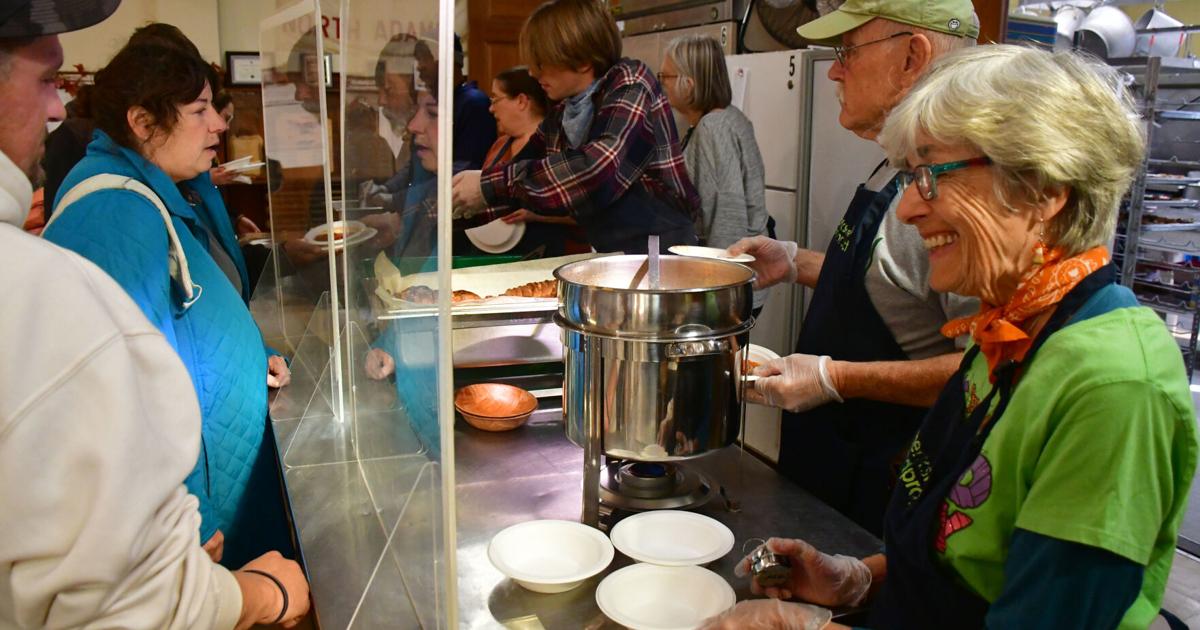Copyright berkshireeagle

NORTH ADAMS — When SNAP benefits alone aren’t enough, some residents of the area turn to the Berkshire Food Project. Volunteers from the project prepare home-cooked hot lunches to serve for free every Monday through Friday at the First Congregational Church. “We can’t afford food as is,” said one woman, who was dining with her family of five on Tuesday's fixings — beef and vegetable stir fry with desserts. Demand for those meals could grow in the coming days: About 22,000 people in Berkshire County are poised to miss out on SNAP benefits, which they rely on to buy food, due to the ongoing federal government shutdown. The U.S. Department of Agriculture has said it will not be distributing SNAP — Supplemental Nutrition Assistance Program — benefits next month. This means no additional dollars will be uploaded to EBT cards Nov. 1, but leftover funds from October will carry over. It would be the first time in the program's history that benefits will be delayed due to a federal government shutdown. In the past, officials have sent SNAP funds early to prevent any interruption. Massachusetts is one of 25 states suing the USDA for “unlawfully suspending” SNAP, arguing the department has access to SNAP-specific contingency funds for this very purpose. The director, however, said the contingency funds wouldn't even cover the cost of a single month's payments. But food insecurity organizations in Berkshire County are scrambling to fill in the void, and they are reminding residents that there resources to support them during this time, including food pantries and other programs. The Massachusetts Healthy Incentive Program, which uses state funds to purchase fruits and vegetables with an EBT card, will still be available to SNAP users who have any balance left on their EBT card. A household can get $40, $60 or $80 in HIP benefits depending on the number of people. As long as the balance isn’t $0, families will still be able to use next month's HIP. If they have already spent all their October funds, they won’t be able to access HIP in November. There also are market match programs available, which give $30 per person for people with an EBT card to spend at the farmers market. While this doesn’t come close to making up the difference lost from SNAP, it can be a start. “So in theory, you won't be getting SNAP, but at a farmers market, you could still have your HIP and $30,” said Margaret Moulton, executive director of Berkshire Grown, a local organization that promotes local farms and strives to help fight food insecurity. “So it's a good thing for people in Massachusetts.” Food pantries that are already spread thin are scrambling to account for the impending increase in visits caused by the lack of SNAP, and it’s going to take a community effort to support those impacted, according to multiple food insecurity assistance organizations. “Food pantries are already serving hundreds of more families than they were set up to,” said Morgan Ovitsky, executive director of Berkshire Bounty, which also aims to boost food security. About 50 percent of households in the county are struggling financially in some way, said Katherine von Haefen, interim president and CEO of Berkshire United Way. A majority of which are working people, but don’t make enough to meet basic needs. "When households are financially struggling, their food bill is something that they can offset by going to a food pantry,” she said. Berkshire Bounty is one of several organizations scrambling to boost donations, support the people they serve and help food pantries plan for what comes next. “The network of food security organizations needs support now more than ever,” Ovitsky said. Berkshire Grown is using money it had set aside for holiday food purchases to buy extra food now, as pantries prepare for a surge in demand. “We and our partner, Berkshire Bounty, have decided to use that extra to meet the need as we hear about it from the food pantry,” Moulton said. “So it's a huge increase in shoppers coming right now in November, we're going to use that extra little cushion that we've been saving for holidays just right now when the need is very immediate.” Also impacted are the places that take SNAP, including grocery stores and farmers markets. Ovitsky said shutdown could amount to a $4 million retail loss in SNAP purchases at grocery stores. For farmers, Berkshire Grown said a combination of SNAP and HIP can be around 30 percent of their farmers' profit for one day. “The more negative side of things is that farmers are going to be impacted alongside the people who depend on SNAP,” said Martha Suquet, Farm to Food Access Manager for Berkshire Grown. “Everyone's done so much work to build up SNAP shopping at farmers markets and at farm stands. So it does affect the individual shoppers, but it does then affect farmers because shoppers might not be buying as much from farmers.” Over the last several seasons, Berkshire Grown has seen an increase in the number of visitors using SNAP, so farmers have been producing more to keep up and were therefore hoping to earn more. But, without SNAP benefits, even for one month, farmers, many of whom are also on SNAP, are going to lose vital revenue. “I do hope people continue to come to the farmers market throughout November, because there are going to be benefits that they can still access there,” Suquet said. “Just because they might not have access to their SNAP benefits that they still feel like the farmers markets are there for them. “ At the First Congregational Church, the Berkshire Food Project serves around 200 people daily — roughly 100 in-house meals and 100 to-go meals, executive director Matt Alcombright said. But that number spiked to 284 on Friday, a record-high, single-day attendance. "We want people to know that we'll be here," Alcombright said. "We're ready to serve and combat this, and we'll do the best we can." Since Alcombright started as director Sept. 8, he said he has seen a 5 percent increase in meals served, and a 33 percent increase in new faces served. From October 2024 to October 2025, the lunch service overall saw a 38 percent increase in service. He said that the numbers are quickly growing as November nears because people are realizing their benefits will soon run out temporarily. The food project has 50 to 60 volunteers at any time and an active volunteer waitlist. Ovitsky recommended those qualified to continue applying for SNAP, as applications are still open. She added the community can help by donating shelf food, funding to purchase food and donating gift cards. Von Haefen said her organization is focused on bringing the community together to help get through this by coordinating donations and volunteer efforts, and working with other food pantries and with state officials. “Berkshire United Way is all about bringing the community together to solve problems,” she said. “The government has shut this down, but the people are hopefully going to come together to support one another."



